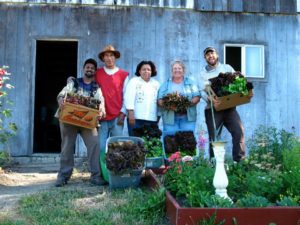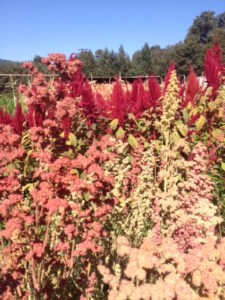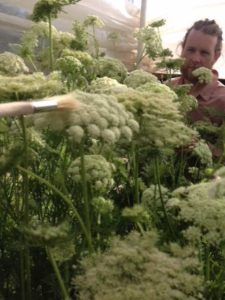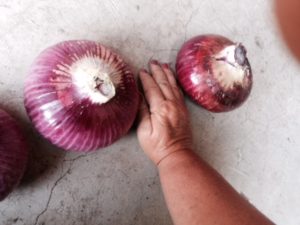
Ellen Bartholomew is always up to something. On most days she can be found tending the garden at Christ’s Church of the Golden Rule. Nestled in a valley in Northern California since 1968, the property is very diverse – from open farm land, fruit and nut orchards, riparian areas, ancient redwoods, oak woodlands, and forested hillsides. Her eyes smile as she looks over the rows of crops planted with gentle intent to feed and nourish her community. Despite the drag of the summer heat and the endless lists of things to be done, she is unfazed. To her, she sees the bigger picture in these fields.
Bartholomew grew up the daughter of a wheat farmer in the Intermountain West. Despite having deep roots in agriculture, it wasn’t until later in life that she found her way back to it. A Multicultural Studies major in college she now found herself part of the Ecology Action crew managing teaching gardens and learning about intentional communities. Working with John Jeavons was an important piece of the puzzle of where she would end up. When she started to garden was when she began seeing all the parallels of how seeds and cultures have traveled through history and shaped our world today.

Of Golden Rule Garden’s three-acre garden, about 15% is dedicated to seed production which grows alongside food and flower production. Bartholomew has found that this system allows her to strike a healthy balance. She said, “My purpose here is to feed the community, so harvest the lettuce that isn’t the perfect type for seed production and make that for lunch, which makes sense to me.” Her system is compiled around grain, flowers, and mixed vegetables. Basically, “let things go to seed, harvest the seed, sell the seed pods to the flower markets, sell the cleaned seed to the seed markets.” What would otherwise be waste from seed production goes first to the local food bank, incorporated into flower arrangements, or finally gets composted and incorporated back into the soil.
In 2000 Golden Rule partnered with Ecology Action to teach students how to grow bio intensively using sustainable agriculture methods. As the program began to bring interns from all of the world to the ranch in Willits, CA, Bartholomew began to see more clearly the food and seed sovereignty issues that exist in other countries and our own. Growing food in a way that increases the nutrition translates all the way down to how the seeds are grown and in turn how the soil is managed. There is so much potential in what we stand to learn from each other if we take the time to listen. Her perspective is that she learns just as much from the interns as they learn from her and the ranch. It’s this outlook that enables her to truly excel at her job. Bartholomew has always seen herself as a lifelong student and her humbleness also allows the free exchange of information between members of her community and beyond. Her work with Golden Rule has given her the ability to tie together her love of learning with her love of supporting her community.

Bartholomew is in the process of becoming certified organic. She sees this as a powerful stepping stone toward her ultimate goal. Having the focus be on supporting the local economy and putting the effort and work into the community has always been at the forefront of her operation. One of the ways she is achieving this is through the new partnerships that came from Bountiful Garden’s closure in November of 2017. Bartholomew took this local loss and turned it into an opportunity to bolster and empower the local growers in the area. She currently works with and grows seed for Sundial Seed Company and Quail Seeds both located in Willits and both former employees of Bountiful Gardens. These relationships are a perfect example of the power and resilience that are present in community.
Currently, Bartholomew grows seed to pay for the infrastructure of Golden Rule’s gardens. The money she makes from the seed sales goes directly back into the garden to buy things like irrigation parts, garden supplies, and more, which in turn helps the garden thrive and thus feed the community. She uses a large portion of the seed she grows for planting the following year. The reason behind this is twofold – she knows that the seed is reliable and adapted to her operation, and she maintains rare and heirloom varieties that are hard to find. Shepherding and keeping the germplasm of these unique varieties is important to her. Perhaps an unintended product of her stewardship has been that people now look to her for access to these rare varieties because they know she’s maintaining them. She sees her collection of rare seeds as somewhat of an ark.
“When you maintain an heirloom variety it prepares you for an environmental disaster. If you have a bad year, or some sort of environmental pressure, you can have varieties that adapt out of that. Seed keepers have to think way far into the future,” says Bartholomew.

Some of these varieties she maintains range from staple crops like Thousand Headed Kale grown out from Bountiful Garden’s old stock, to things people have brought to her to save. She has barley recovered from the Tigris Euphrates river bottom, ancient quinoa, a range of lettuces and carrots and amaranth, and a local red onion variety that would have otherwise been lost if it were not for the persistence of a friend, determination of Bartholomew, and maybe just a little bit of luck.
She speaks of her work with such music and encouragement in her voice. If she could give one piece of advice to any new seed grower it would be to try new things. As a seed keeper it’s nice to try something fresh and keep it exciting.
“Try something that you’ve never tried before. Try a crop that maybe is losing ground and needs some revitalization,” says Bartholomew, who in sincere fashion makes a point to incorporate a new crop into her operation each year.
If there is one thing to be learned from Bartholomew, it is simply: don’t be afraid to try. Several years ago she had an intern come to the ranch who had grown up in Peru and learned how to wash and clean quinoa from her family there. Bartholomew saw the opportunity to learn this family technique and put it to practice in her operation. She now grows quinoa as one of her main staple crops for the farm and community. Bartholomew’s openness has gotten her where she is today and her resilience and creative approach to farming and life will continue to take her great places.
